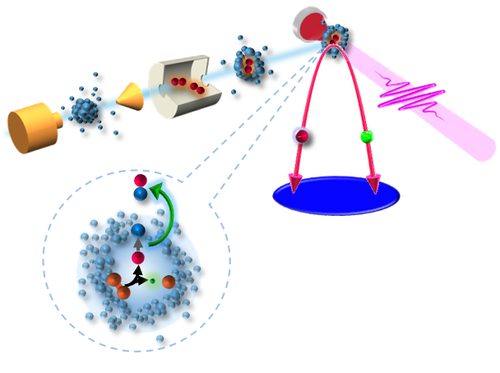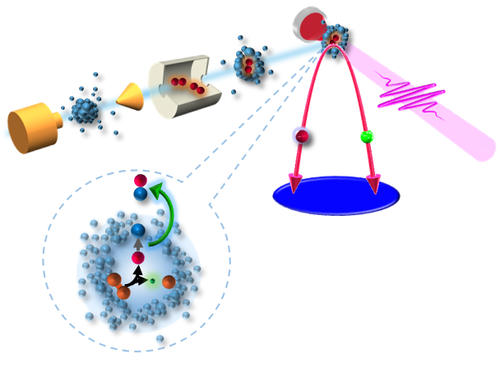Small Molecules Twirl Freely in a Helium Droplet
Molecules in a gas can freely rotate, feeling no friction from their far away neighbors. In a liquid, however, friction has an impact because of the closer packing of the system’s constituents. This friction normally manifests as drag that slows the motion of any rotating molecule, but Junjie Qiang of East China Normal University and his colleagues now show that this isn’t always the case [1]. They find that a deuterium ( D2) molecule inside a superfluid helium nanodroplet rotates as if it feels zero friction. The finding offers insight into molecular behavior in a superfluid environment.
Researchers have exploited pulsed lasers to spatially align molecules in a gas, using those molecules to explore the dynamics of photochemical reactions, for example. Recently, alignment experiments were extended to molecules suspended in liquid helium nanodroplets, allowing for studies of much larger molecules that are tricky to produce in the gas phase.
Going in the opposite direction, Qiang and his colleagues explored rotation in a liquid helium nanodrop of D2 molecules, the smallest of all molecules. To get D2 inside the nanodrops, they passed droplets containing 2000 helium atoms through D2 gas. They then set the captured D2 molecules rotating with a femtosecond-pulsed laser beam. Monitoring the rotational dynamics, they observed a friction-free motion that persisted for more than 500 periods—the same duration as observed for D2 molecules in a gas.
The team says that the technique should allow measurements for even longer times, allowing them to test the limits of the frictionless rotation. The technique should also work with other molecules, such as acetylene, thereby bridging the gap to much heavier molecules, including carbon dioxide.
–Rachel Berkowitz
Rachel Berkowitz is a Corresponding Editor for Physics Magazine based in Vancouver, Canada.
References
- J. Qiang et al., “Femtosecond rotational dynamics of D2 molecules in superfluid helium nanodroplets,” Phys. Rev. Lett. 128, 243201 (2022).





